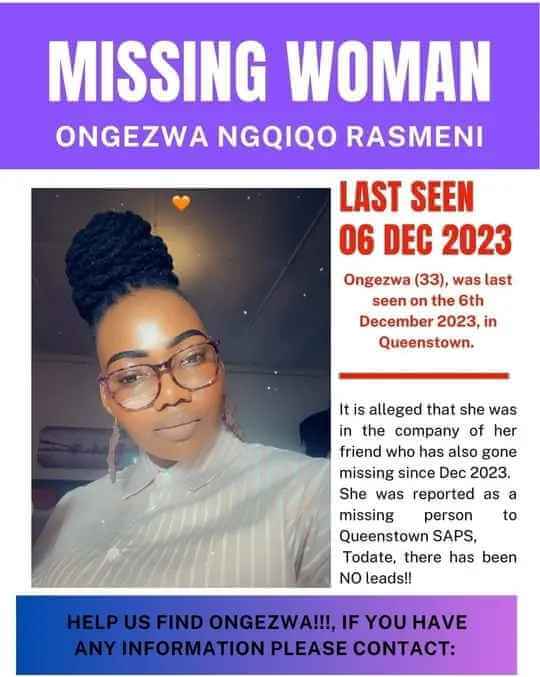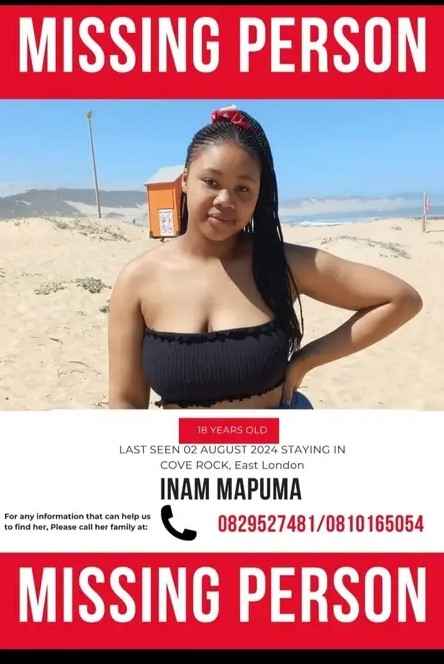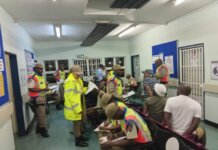As the country commemorates August as women’s month, it’s contending against the sudden scourge of missing women, which has left many female citizens questioning their own safety.
There’s not even a single day in SA, and Eastern Cape in particular, where a missing person’s notification does not gain social media traction, and this new scourge is beginning to invoke some discomforts among citizens.
Security experts, on the other hand, are also chipping in to raise concerns of their own.
For at least the last three months, not a single day passes without circulating pictures of missing people, mostly women flooding the social networks.
The latest casualty is a Cape Town woman who was last seen living the popular Rands hangout spot in Khayelitsha, but never made it home.
But it is the story of a Queenstown woman who is still yet to be found after she disappeared in December last year, living behind a small child, that continues to send chills through the spines of many South Africans.
Ongezwa Ngqiqo Rasmeni (33), was last seen on December 6, allegedly in the company of an unnamed friend, who has also since gone missing. She was reported to the Queenstown SAPS, but to date, there are still no leads.
Concerned friends and relatives, fearing the worst, eventually resorted to social media and posted frantic messages appealing to anyone who could have information regarding her whereabouts.
There have also been incidents of kidnapped men, who are later found dead, with the most recent incident involving a man from King William’s Town, who was abducted and found dead two days later.
According to a Statistics SA report, as of the 2022/2023 financial year, the total number of kidnapping cases in South Africa reached 15 343. But according to a 2023/2024 Police Crime Statistics report, between July and September last year, there were 4 300 cases of kidnapping, with most of it involving women and children.
These have also sparked concerns from private security experts, who admit that the spate of missing women has reached terrifying levels.
Mthatha-based private security company Tyeks Security Services has attributed the alarming series of missing women to various socio-economic factors such as unemployment and the reluctance from communities to blow the whistle on predators.
“There are people in communities who are aware of these incidents, but are scared to report, that’s what we’ve discovered. During our patrols in various sites and streets across the country, we realise that communities are scared to talk about such things, and that’s when we engage the police,” said the company’s national head of operations, Granger Croener.
The issue of unemployment is also tempting criminals and syndicates to traffic people for body parts, just for a quick buck. There’s also this issue of families waiting for too long before reporting a missing person, and by the time they do, the person has long crossed the border,” said Croener.
At the time of print, social media was abuzz regarding a missing teenage girl Inam Mapuma, who was last seen on Friday August 2 in Cove Rock, East London.
Croener has also appealed to parents and guardians of young women to impose strict curfews on the youngsters, to increase a sense of accountability.
“But that’s not only the responsibility of elders, but each person must also be accountable for their own safety and security. One should have a specific time at which they are normally home, so that should they not be back by that time, the family can start raising the alarm. Always report your whereabouts and let everyone know who you are with”.
Croener has appealed on communities to have social WhatsApp groups, where they constantly engage each other on any activities happening in their streets, and warned women, when hitch-hiking, to send details of vehicles to their loved ones.
“Women must walk in groups and not individually, especially when leaving party or liquor spots at nights. We’ve seen during our night road patrols, cases where a drunk woman would be walking all alone, risking being abducted. Some of them, unfortunately go missing in that fashion.”
Another factor adding to difficulties in finding missing persons, according to security expert Thandekile Mhlanganyelwa, is the piling up of unidentified bodies in state mortuaries.
“Someone else would have been travelling and died in an accident or got attacked, but for some reason gets unidentified. Families must know the travelling arrangements of loved ones and if one has a mental illness that would normally cause them to go missing, the family should guard that person tightly,” said Mhlanganyelwa.
In May last year, Dr Kathryn Smith, an interdisciplinary visual and forensic artist and chairperson of the Department of Visual Arts at Stellenbosch University, announced that an estimated 10 000, unidentified bodies in South Africa’s medico-legal laboratories are waiting to be identified each year.










